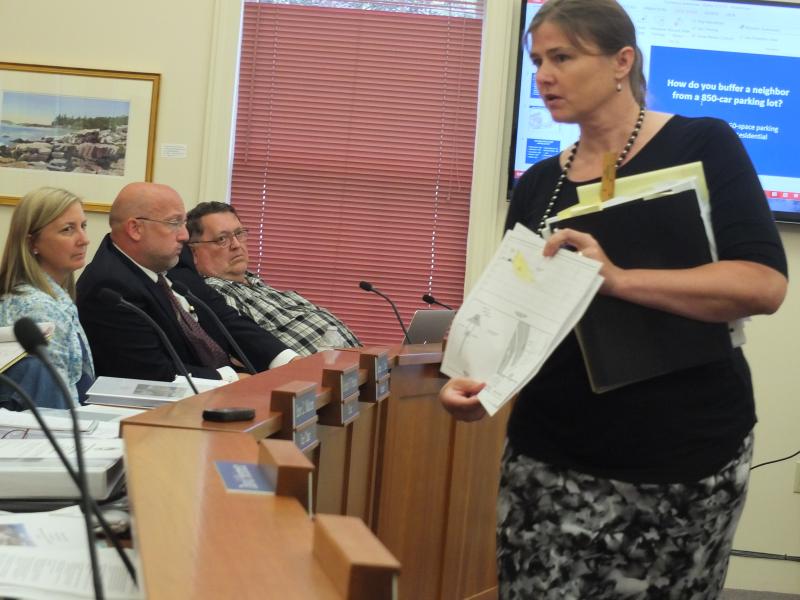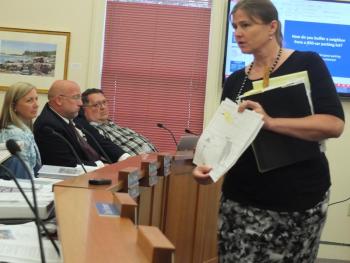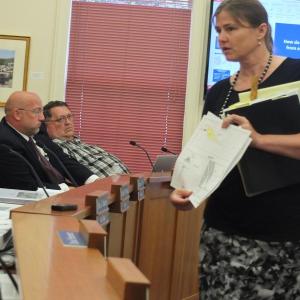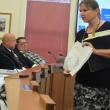Anthony family’s appeal will take two more hearings
 Attorney Sarah McDaniel presents information July 27 to the Boothbay Appeals Board regarding the Anthony family’s challenge of a building permit granted to Coastal Maine Botanical Gardens’ expansion project. BILL PEARSON/Boothbay Register
Attorney Sarah McDaniel presents information July 27 to the Boothbay Appeals Board regarding the Anthony family’s challenge of a building permit granted to Coastal Maine Botanical Gardens’ expansion project. BILL PEARSON/Boothbay Register
 Attorney Sarah McDaniel presents information July 27 to the Boothbay Appeals Board regarding the Anthony family’s challenge of a building permit granted to Coastal Maine Botanical Gardens’ expansion project. BILL PEARSON/Boothbay Register
Attorney Sarah McDaniel presents information July 27 to the Boothbay Appeals Board regarding the Anthony family’s challenge of a building permit granted to Coastal Maine Botanical Gardens’ expansion project. BILL PEARSON/Boothbay Register
It will take two more meetings before the Boothbay Board of Appeals rules regarding a building permit for Coastal Maine Botanical Gardens’ expansion. The board has held three hearings on an appellant’s challenge to a Dec. 12 planning board decision granting CMBG a permit for its $30-plus million expansion.
A July 27 hearing lasted three hours and 41 minutes. A fourth was scheduled to hear CMBG’s rebuttal and closing statements from the opposing lawyers. On Aug. 31, the board will also hear final public comments prior to begin deliberations in an executive session. After an approximately two-hour deliberation, the board will adjourn and return on Sept. 14 to decide whether to uphold or deny the appeal filed by the Anthony family.
Prior to the July 27 hearing, appeals board attorney John Shumadine advised members to only consider testimony delivered during the proceedings and not news coverage relating to the expansion project being served with four Maine Department of Environmental Protection notices of violations in June.
“What we’re doing here is based on the record tonight and past hearings. The enforcement decision shouldn’t bear on your decision, ” he said. “I know this is hard advice, but focus on the evidence not the press coverage.”
The Anthony family’s Gaecklein Road’s farmhouse is the Gardens’ closest and largest abutter. Previously, the family appealed a DEP permit for CMBG’s expansion project. The state agency hasn’t set a date for the family’s appeal. But the family’s appeal regarding Boothbay’s approval began March 28. The second hearing was June 28 when CMBG attorney Mary Costigan described her clients’ efforts to meet state and local ordinances resulting in receiving DEP, Army Corps of Engineers and town of Boothbay permits.
On July 27, it was the Anthony family’s turn. Attorney Sarah McDaniel reminded board members the proceedings are a de novo review meaning they were acting as if they were a planning board. She described previous permits approved by DEP and the town as being “too narrow and didn’t explore deeply enough into ordinance criteria protecting the Knickerbocker Lake Watershed and rural neighborhoods.”
Four members of the Anthony family joined McDaniel in a nearly three-hour presentation. Vaughn and Jodie Anthony live in the farmhouse abutting the Gardens. They both discussed problems associated with living near the Gardens. Jodie Vaughn stated this was the first time in her 77 years she has spoken in public. She detailed inconveniences experienced by the ongoing construction and past noises attributed to living near the Gardens.
“We know in time the 10-hour days, six days a week of relentless construction noise will just be a bad memory. So will six and half months of blasting, but then we’ll be left with seven days a week of 850 cars on tiered parking lots located on the hills west of us. We hear every parking lot conversation, door slam, car alarm and baby crying,” she said.
Vaughn Anthony discussed environmental problems caused by living so close to the construction site and future parking lots. He believes his well and the Knickerbocker Lake Watershed are both destined for contamination.
“We feel strongly our well is lost in a matter of time. I don’t see how we can avoid it,” he said. “And it won’t be long before Knickerbocker Lake is lost, too!”
Their two sons also made presentations. Jason Anthony lives in Bristol and works at the Deck House School in Edgecomb. His presentation focused on whether CMBG is a museum or educational facility. Town ordinances bar museums in the Knickerbocker Lake Watershed. Jason Anthony described the Gardens’ programs as being more in line with a museum, not a school. He also stated that in a previous grant application CMBG described itself as a museum.
“Education is a secondary function,” he said. “Visitors are not students. Total educational participants account for less than 10 percent of what they do. Seven percent of their staff are teachers and students account for three percent of visitors. They don’t even come close to meeting standards as an educational facility.”
Kevin Anthony, who lives on Gaecklein Road, focused on environmental reports commissioned by the town and Boothbay Region Water District challenging DEP findings regarding the amount of acceptable phosphorus runoff into the Knickerbocker Lake Watershed .
“This is a massive commercial development in a residential zone. It never should’ve been allowed,” he said. “The Forrest Bell and Wagner Kretchmer reports both conclude the locations of the parking lots and septic systems shouldn’t be in a watershed and DEP calculations about the amount of allowable phosphorus runoff is too low.”
Two members of the public also addressed the appeals board. Boothbay Harbor resident Gary Arnold spoke about his experience as a member of the West Harbor Pond Association. He described Knickerbocker Lake as already having problems with algal blooms caused by increased phosphorous and characterized the expansion project “as making the situation worse.”
East Boothbay resident Joe Paolillo spent three years on the comprehensive plan committee. He objected to comments stating CMBG was “trying to swindle, pull one over, or get away with something.” Paolillo described each party as doing what they thought was right. He also advised appeal board members to follow current regulations in making a decision.
“There is no perfect solution. I advise using what laws are already on the books and do the best you can in what is a very hard decision,” said Paolillo.
The next hearing will include Costigan giving her rebuttal to the appellant’s case. Both lawyers will get five-minute closing statements. Those will be followed by any last public comments. The board will deliberate for a couple of hours, reviewing testimony before adjourning, according to chairman Dick Perkins.
Event Date
Address
United States
























